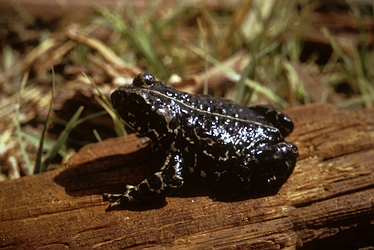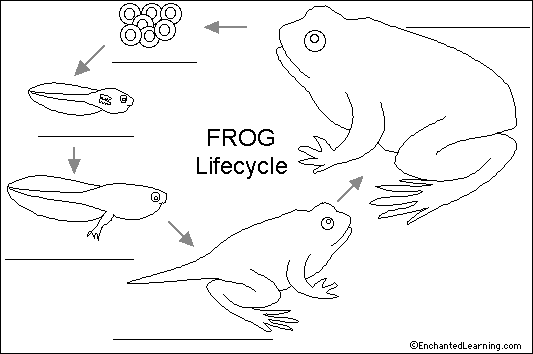
Teaching Unit
Frogs
4th Grade
Frog Facts:
Frogs are amphibians. Amphibians are frogs, toads, salamanders, and caecilians( worm-like amphibians). The word means double life--many species spend part of their life in water and land environments. Because their skin lacks a shell, scales or outer drier covering, most amphibians live in wet or damp situations to prevent dehydration.
Amphibians are
cold-blooded vertebrate animals (animals with a backbone) . They differ from
reptiles in that they lack scales and generally return to water to breed.
Difference Between Frogs and Toads:
Characteristics of Frogs:

Characteristics of Toads:

Life Cycle Of A Frog:
 Frog
eggs
Frog
eggs
 Toad eggs
Toad eggs
1st: Egg-

This
stage hatches from the egg. The tadpole spends its time swimming in the
water, eating and growing. Tadpoles breathe using gills and have a tail.
3rd:
Tadpole with legs -

In
this stage the tadpole sprouts legs (and then arms), has a longer body, and
has a more distinct head. It still breathes using gills and has a tail.
§4th:
Froglet -

In this stage, the almost mature frog breathes with lungs and still has some of its tail
§5th:
Adult -
![]()
The adult frog breathes with lungs and has no tail (it has been absorbed by the body).
Picture Of A Frog's Life Cycle

Frog Tracks

Look for these frog tracks near wet marshes, ponds and streams wherever frogs are common!
Frog Teeth

Frogs have teeth, but not like this silly picture. They have a ridge of very small cone teeth around the upper edge of the jaw. They don't have anything that could be called teeth on their lower jaw, so they usually swallow their food whole. The so-called "teeth" are mainly used to hold the prey and keep it in place till they can get a good grip on it and squash their eyeballs down to swallow their meal. Ewww sounds gross!
What Do Frogs Eat?:
Adult frogs will seldom eat dead or still objects--they are attracted to moving
things such as:
live earthworms
insects
spiders
crickets
fruit flies or moths
Frog Enemies:
Frogs have to watch out for all kinds of enemies in the wild. Animals that eat frogs are:
snakes
lizards
birds
and various small animals like hedgehogs.
and maybe other hungry frogs
Frog Protection:
Many frogs rely
on the art of camouflage to avoid getting spotted by predators.
Some blend with their backgrounds, while others even change colors to match the
backgrounds!
Can you see the frog in this picture? It
is really hard. He is doing a good job of camouflaging himself.

Pictures of Frogs:



Green Treefrog Bullfrog Carpenter Frog



American Toad Squirrel Treefrog Pinewoods Treefrog
| Resume' | Activities |
| All About Me | Educational Links |
| Photos | Home Page |
| Power Point |